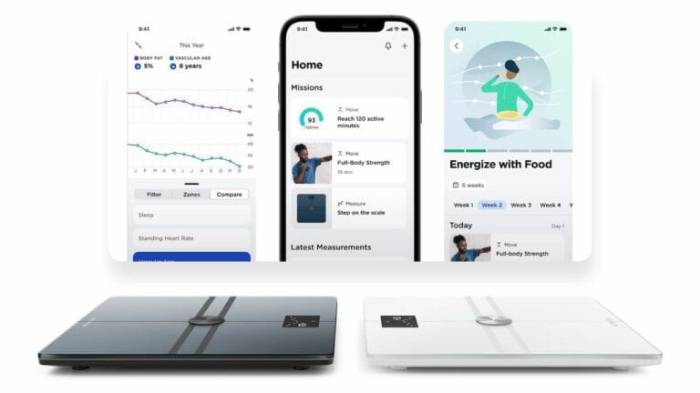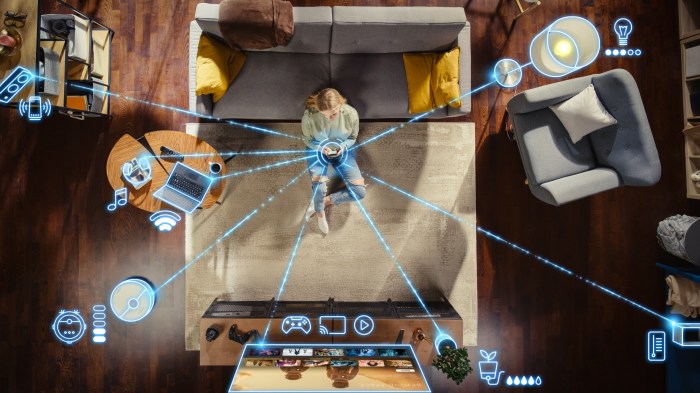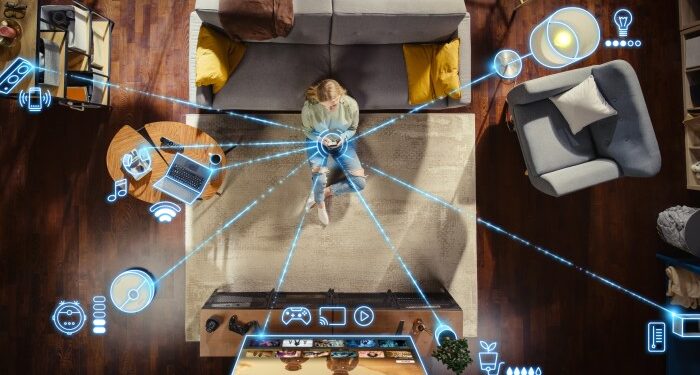Exploring the intersection of technology and well-being, this discussion delves into the transformative impact of smart devices on our health routines. From tracking exercise to monitoring sleep patterns and managing stress, these devices are revolutionizing the way we approach healthy living.
As we navigate this digital landscape, it's fascinating to uncover how smart devices are reshaping our habits and empowering us to make informed choices for a healthier lifestyle.
Impact on Exercise Routines
Smart devices have revolutionized the way we approach fitness and exercise routines. These devices offer a range of features that help individuals track their physical activity, set fitness goals, and receive real-time feedback during workouts.
Tracking Physical Activity
Smart devices come equipped with sensors that can track various metrics such as steps taken, distance covered, calories burned, and even heart rate. By monitoring these metrics, users can get a clear picture of their daily activity levels and make informed decisions about their fitness routine.
- Smart devices utilize accelerometers to track movements and calculate steps taken throughout the day.
- GPS technology allows for accurate tracking of running or cycling routes, providing detailed information on distance and pace.
- Heart rate monitors provide valuable insights into the intensity of workouts, helping users optimize their training sessions.
Setting Fitness Goals
One of the key benefits of smart devices is their ability to help users set and achieve fitness goals. Whether it's aiming for a certain number of steps per day or training for a marathon, these devices provide personalized recommendations and progress tracking to keep users motivated and on track.
- Users can set specific goals for steps, calories burned, or active minutes, with the device providing reminders and encouragement to stay on target.
- Advanced smart devices use algorithms to analyze user data and suggest achievable goals based on individual fitness levels and progress.
- Setting realistic and measurable goals through smart devices promotes consistency and long-term adherence to an exercise routine.
Real-Time Feedback During Workouts
Smart devices offer real-time feedback during workouts, allowing users to monitor their performance and adjust their intensity or technique as needed. This instant feedback can help individuals push themselves harder, avoid overtraining, and make the most out of their exercise sessions.
- Visual cues on smart device screens show real-time data such as heart rate, pace, and distance covered, enabling users to stay in the optimal training zone.
- Audio prompts or vibrations can alert users to changes in intensity or milestones reached, keeping them engaged and motivated throughout their workout.
- Smart devices can also provide post-workout summaries and analysis, helping users identify areas for improvement and track their progress over time.
Influence on Sleep Patterns

Smart devices have revolutionized the way we monitor and improve our sleep patterns. By utilizing advanced technology, these devices offer valuable insights into our sleep quality, duration, and overall habits. This information can help individuals make informed decisions to optimize their sleep routines for better health and well-being.
Monitoring Sleep Quality
- Smartwatches and fitness trackers equipped with sleep tracking features monitor factors such as heart rate variability, movement, and breathing patterns during sleep.
- These devices provide detailed analyses of different sleep stages, including deep sleep, light sleep, and REM sleep, allowing users to understand their sleep cycles better.
- Some smart devices also offer personalized recommendations based on sleep data, such as adjusting bedtime routines or creating a more conducive sleep environment.
Benefits of Using Smart Devices
- Improving sleep habits can lead to enhanced cognitive function, mood regulation, and overall health and wellness.
- Smart devices help individuals track progress and set goals for achieving better sleep quality, promoting a proactive approach to self-care.
- By identifying patterns and trends in sleep data, users can make targeted lifestyle changes to address specific sleep issues and improve overall sleep satisfaction.
Examples of Smart Devices
- The Fitbit Charge series offers advanced sleep tracking features, including Sleep Score assessments and guided programs to improve sleep quality.
- The Oura Ring uses advanced sensors to analyze sleep patterns, providing detailed insights into sleep stages, recovery, and readiness levels.
- The Withings Sleep Analyzer is a non-wearable device that tracks sleep cycles, heart rate, and snoring patterns to help users understand their sleep quality and make necessary adjustments.
Nutrition Tracking
Smart devices have revolutionized the way individuals track their dietary intake, making it easier to monitor food consumption and make healthier choices.
Apps and Devices for Monitoring Food Consumption
- One popular example is MyFitnessPal, a mobile app that allows users to log their meals and track their calorie intake.
- The Fitbit app also has a feature that lets users input their food consumption and provides nutritional information.
- Smart kitchen appliances like the SmartPlate can even analyze the nutritional content of the food placed on it and track portion sizes.
Promoting Healthier Eating Habits
By providing users with real-time feedback on their dietary choices, smart devices encourage healthier eating habits. Users can set goals, receive alerts, and access personalized recommendations to improve their nutrition.
Stress Management

In today's fast-paced world, stress has become a common issue affecting mental well-being. Smart devices are playing a significant role in helping individuals manage and reduce stress levels effectively.
Techniques and Features for Stress Reduction
- Guided Meditation Apps: Smart devices offer various meditation apps that provide guided sessions to help users relax and calm their minds. These apps typically include breathing exercises, visualization techniques, and calming music to reduce stress.
- Activity Trackers: Monitoring physical activity through smart devices can help individuals stay active, which is known to reduce stress levels. Setting activity goals and tracking progress can motivate users to engage in regular exercise, which acts as a stress reliever.
- Stress Tracking Tools: Some smart devices come equipped with stress tracking features that monitor heart rate variability or skin conductance to detect stress levels. By becoming aware of their stress patterns, individuals can take necessary steps to manage stress effectively.
Impact on Mental Well-Being
Smart devices have revolutionized the way individuals approach stress management, leading to a positive impact on mental well-being. By incorporating stress-reducing techniques and features into daily routines, individuals can proactively address their stress levels and improve overall mental health.
Closure
In conclusion, the evolution of smart devices presents a promising future for health and wellness enthusiasts. By leveraging cutting-edge technology, individuals can take charge of their well-being like never before, paving the way for a healthier and more balanced lifestyle.
Detailed FAQs
How do smart devices track physical activity?
Smart devices utilize sensors to monitor movement and calculate metrics like steps taken, distance covered, and calories burned.
Which smart devices offer insights into sleep cycles?
Devices like fitness trackers and smartwatches equipped with sleep tracking features provide detailed analysis of sleep stages and patterns.
Can smart devices help in managing stress?
Yes, smart devices offer features like guided breathing exercises, mindfulness apps, and stress tracking to assist users in stress reduction and management.
What impact do smart devices have on promoting healthier eating habits?
Smart devices help users track their dietary intake, offer nutritional insights, and encourage mindful eating practices, contributing to healthier food choices.



